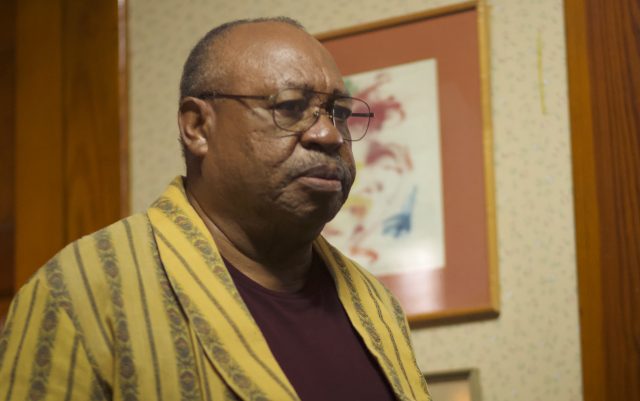Gosnell: True Crime, by Tyler Smith
Some movies are just inherently difficult to review, largely due to their intentions. These films could be trying to spur on some kind of social, political, or spiritual change within the viewer, making it nearly impossible to discuss the artistry of the film without addressing its larger goals, as well. This is certainly the case with Nick Searcy’s Gosnell, the new film about Kermit Gosnell, the abortion provider whose Philadelphia clinic was a filthy, nightmarish place where Gosnell routinely flouted abortion law and caused the deaths of dozens of babies, either through negligence or willful disregard. Gosnell was eventually brought to trial in 2013, an event that famously received very little press coverage despite (or perhaps because of) its roots within the hot button issue of abortion.
It is clear that the case’s initial low profile is what led to this film’s production. Politically conservative commentators have long contended that the mainstream media is biased in its covering of abortion; a claim bolstered by an in-depth New York Times study from 1990 that illustrates subtle differences in media language when discussing the topic. When details of the Gosnell case came out, there were even some left-leaning journalists that acknowledged a potential bias in the choice not to cover the case, or even the general lack of awareness of it.
This overtly political aspect of the case is a major subplot of Gosnell, and it is one of the ways that the film wears its intentions firmly on its sleeve. This film doesn’t merely have a political agenda, but it is often presented with a seething anger. This is not necessarily a crime. Some of the best movies ever made have been agenda-driven; films like Oliver Stone’s JFK, Sergei Eisenstein’s Battleship Potemkin, and Spike Lee’s Do the Right Thing. Where this anger can become a liability is in those moments when it obscures some of the more genuinely effective elements of the film.
Of course, some right-leaning commentators might suggest that whatever negative criticism this film may receive is less a function of its artistic merits and more about its political worldview. And maybe they’re right. Perhaps artistic anger is only appropriate when it is in service of left wing causes. While I’m inclined to give critics of any film the benefit of the doubt, I do often wonder, being politically conservative myself, just how much our personal beliefs can blind us when discussing films such as this, either to their flaws or merits. I wonder exactly how many critics would be fine with the film’s frustrated tone if it came out in favor of abortion, and how many others would roll their eyes.
These are the things that a critic can’t help but think about when reviewing a film as politically-charged as this. And, make no mistake, it is a conservative production through and through. With a story by crime novelist and conservative commentator Andrew Klavan (who, full disclosure, is an acquaintance of mine), directed by actor and outspoken Republican Nick Searcy, and starring a number of known conservatives, including Dean Cain and Alfonzo Rachel, Gosnell certainly has its right wing bona fides in order. But, again, none of this automatically negates the film’s quality, so the ultimate question is, as it always must be, “Is it effective as a film?”
It was certainly effective for me, and not merely because of my political leanings. Klavan, along with writers Phelim McAleer and Ann McElhinney, wisely decides to focus on the procedure behind the Gosnell investigation and trial. Doing so immediately gives sharp focus to a film that could have been narratively unwieldy due to its themes. Instead, though, there is a forward momentum to the proceedings that allows the filmmakers the opportunity to inundate the audience with information while never actually interfering with the story itself. This is the same concept that not merely saved films like Billy Ray’s Shattered Glass or the aforementioned JFK from turning into pure exposition, but actually enhanced them due to audience investment. As the film reveals the grisly details of Gosnell’s crimes, we are eager to hear more information, as horrific as it might be.
And, indeed, it is horrific. Regardless of what one may think of abortion, when faced with the Gosnell clinic, one can’t help but be taken aback. The piles of garbage, the dirty instruments, and the bags of human remains make one wonder how anybody – from the patients to the nurses to Gosnell himself – could ever be okay with doing any kind of business in a place like this, much less medical procedures.
Then the details come out about Gosnell’s methods, namely his choice to shirk the law and routinely perform abortions beyond the legal cutoff. This led to a number of botched abortions, in which the baby was actually delivered alive. Many pro-abortion advocates I know would say that they are okay with the abortion of a fetus through all stages of pregnancy, even the later ones, because it is still, in their view, a part of the mother’s body, but that if that baby were accidentally delivered, and was actually alive and crying, it is now a person, deserving of the same rights as anybody else. Gosnell, it would seem, took no such view, and would opt to end the baby’s life, often by snipping through their spinal cord with a pair of scissors. In many cases, he would then cut off the baby’s feet and keep them in jars in the refrigerator, for reasons that remain unclear.
This information is not treated as a matter of public record, despite the case being over five years old now. Instead, it is slowly revealed, bit by bit, over time, by investigators (Dean Cain and Alfonzo Rachel) and prosecutors (Sarah Jane Morris and Michael Beach). And throughout it all is Gosnell himself (Earl Billings), who appears oddly at peace with what is going on. At first, he seems somehow oblivious to the ramifications of his exposure, but we soon come to realize the source of his zen-like attitude.
As the case proceeds, the judge is wary. She knows that this case, while not actually about the legality of abortion, could quickly become about that. She is prepared to let the case move forward, but is more cautious about it than with most cases. It is this caution – the fear that any attempt to enforce abortion law could quickly become politicized – that allowed Gosnell’s clinic to become so putrid in the first place. State inspectors make it clear that they were told not to investigate abortion clinics, lest they be accused of trying to limit access to abortion. Gosnell’s ever-present smile during the investigation is one of smugness, the assurance that comes with being firmly behind a political shield.
Earl Billings’ performance as Kermit Gosnell goes a long way in selling the abhorrent nature of the story. There are moments in which he is almost grandfatherly in his tone, welcoming investigators into his clinic, then politely apologizing for the mess, as though he had merely left a few pots and pans lying around. But there are other moments in which Gosnell is glimpsed as almost completely separate from reality, as when he gently plays his piano while the police search his home. The performance is oddly straightforward, where it could have been heavily overplayed. But Gosnell seems convinced of his own moral rightness, both in what he was doing and the way in which he was doing it. Billings’ performance puts me in mind of John Huston in Chinatown, a genial man capable of more evil than even he appears able to comprehend.
The rest of the cast is all perfectly fine, but there isn’t much to their roles. Character actors Dean Cain and Michael Beach are functional, but aren’t really allowed many impactful moments. Sarah Jane Morris fares a bit better as a prosecutor finding it hard to remain emotionally distanced from the case. With several children of her own, she sees Gosnell’s methods and is genuinely horrified. Director Nick Searcy is unsurprisingly engaging as Gosnell’s shrewd defense attorney. Searcy has consistently turned in committed character performances for thirty years – recently appearing as a villainous military man in last year’s The Shape of Water – so he certainly knows his way around a juicy part, and is able to bring out all of the smarmy condescension the character contains.
These actors and characters are at their most believable when dealing with the specifics of the case and trial. It’s in the unfortunate moments when the script decides to get lofty that everything starts to flatten out a bit. As stated, the case initially received very little media attention, which is obviously frustrating to the filmmakers. However, as the characters address the issue, things come to a halt, and the film’s politics begin to overwhelm its commitment to storytelling. I may personally have been incredulous about the media’s coverage of this case, but, by simply trying to tell the most compelling story possible, the film could have stood as a powerful rebuke in itself. Instead, the writers can’t help but comment hamfistedly on this aspect, and the film suffers as a result.
In the end, though, Gosnell is an effective true crime story that occasionally loses its way, but is able to get back on course enough to have an impact on the audience. It will, however, be interesting to see exactly what impact that will be, as the politically charged nature of the subject and motivations of the filmmakers could come to the forefront of the conversation, drowning out whatever artistic qualities the film contains. Nevertheless, I was surprised by how restrained the film was in addressing its subject. While it is occasionally a little histrionic, part of me wonders if that is so terrible a thing when dealing with this subject matter. In fact, one could make the argument that, had we all been a little bolder and less fearful of political consequences, maybe this story wouldn’t have needed to be told at all. Because it wouldn’t have happened. It’s hard to know, exactly, but it is worth considering, and I think that is ultimately the point that Gosnell is trying to make.































I clearly remember the events addressed by this movie and at the time was equally surprised—and not surprised—by the dearth of media coverage. My surprise was at how such a honorific thing could have for so long gone unchecked. Not being surprised was, of course, knowing a political agenda was the underlying reason. I haven’t yet had the opportunity to see this movie, but I intend to do so.
I’ve looked around for reviews in order to get a sense of how the movie comes across. The few reviews I’ve read as of this date seem even-handed but stilted. It is as if most of those critics have grudgingly felt that this matter and the associated political agenda have been covered without being overly demonized. (Considering the story, it would be hard to “demonize” a demon such as Gosnell, figuratively speaking.) This has made those reviews less informative than I would have liked. So, in light of that, I find this review to have been the most thorough and well thought-out.
It isn’t often I ascribe excellent writing and analysis to a movie review. But I do so in this case. Thank you.
Agree with the above. The podcast Sword snd Scale covers this case in depth, and with appropriate horror, without a political agenda. Exceptional in this age